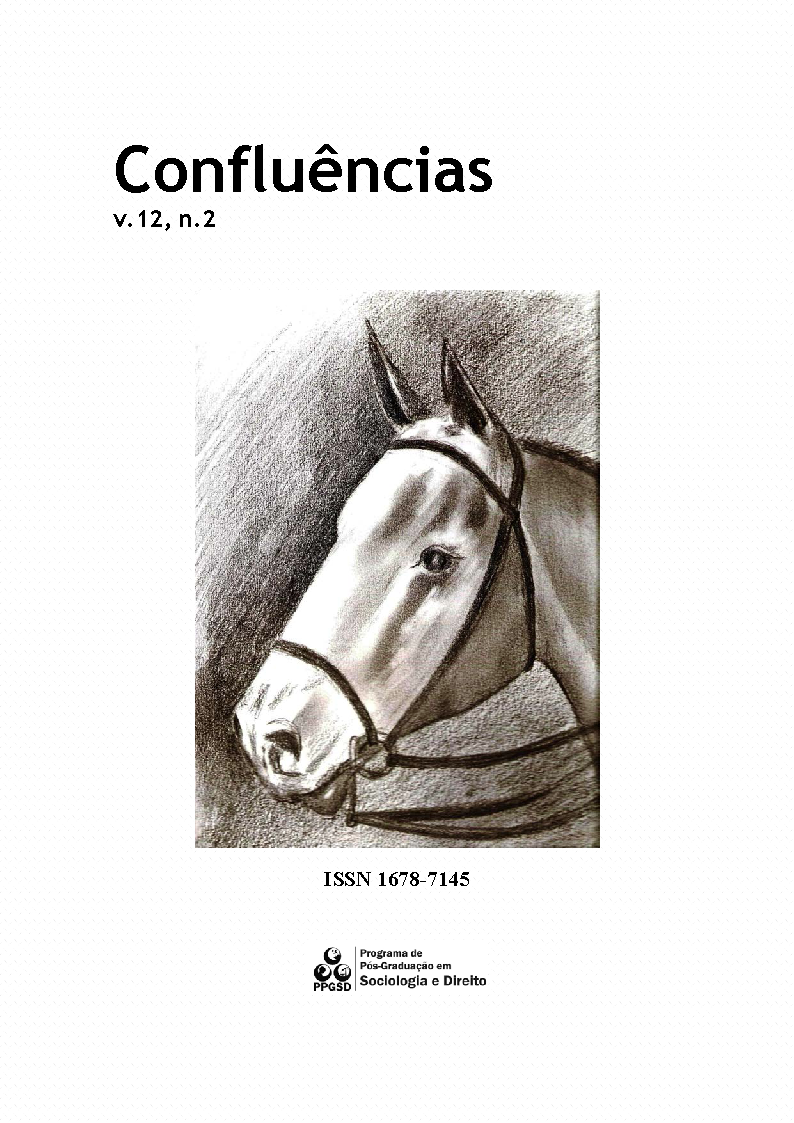O Supremo Tribunal Federal e a diversidade social: Estudo do caso Raposa Serra do Sol
DOI:
https://doi.org/10.22409/conflu12i2.p115Keywords:
Supreme Court, Social Diversity, ConstitutionAbstract
The study aims to analyze the trial of the demarcation of the Raposa Serra do Solin the Brazilian Supreme Court. For that, it was established the comprehension of the
problem in two parts. One was directed at a theoretical division in which were fastened the analytical and methodological contents variables of the democratic process in Brazil, the perspective of the representative argumentation to legitimize the decisions of the Supreme Court and the conception of institutional model. The other segment of the study highlighted the factual case of the lawsuit that did not accept the demarcation of the Indigene Land Raposa Serra do Sol. Beyond the application of theoretical and methodological variables mentioned, there was the concern in to examine the case from the perspective of the objective character that has been given to the trials of the Brazilian Federal Supreme Court. These instruments that were adopted allowed the punctuation of the institutional practice of the Court to materialize the so-called Statute of Indigenous Lands Demarcation with the decision under examination.
Downloads
References
ALEXY, R. Constitucionalismo discursivo. Trad. Luis Afonso Heck. Porto Alegre: Livraria
do Advogado, 2007.
BARROSO, L. R. Judicialização, Ativismo Judicial e Legitimidade Democrática. Rio de
Janeiro: OAB Editora, 2008. Disponível em
<http://www.oab.org.br/oabeditora/users/revista/1235066670174218181901.pdf> Acesso em:
jan.2009
BARROSO, L. R. O Controle de Constitucionalidade no Direito Brasileiro. 3.ed. São Paulo:
Saraiva, 2008.
BENHABIB, Seyla. Las Reinvidicaciones de La Cultura. Igualdad y Diversidad em La Era
Global Buenos Aires: Katz, 2006
BONAVIDES, Paulo; MIRANDA, Jorge; AGRA, Walber de Moura (Coord.). Comentários à
Constituição Federal de 1988. Editora Forense, Rio de Janeiro, 2009
BUENO, C.S. Amicus Curiae no processo civil: um terceiro enigmático. 2.ed. São Paulo:
Saraiva, 2008
CAMARGO, M. M. L. Hermenêutica e Argumentação: uma contribuição ao estudo do
Direito. Rio de Janeiro: Renovar, 2003.
DALLARI, D. A. e outros. Makunaima Grita! Rio de Janeiro: Azougue Editora, 2009.
DEL PRA, C.G.R. Amicus curiae: Instrumento de participação democrática e de
aperfeiçoamento da prestação jurisdicional. Curitiba: Juruá, 2008.
FOUCAULT, M. O Nascimento da Biopolítica. Ed. Martins Fontes. São Paulo, 2008.
GARRIDO, A.; MIRANDA NETTO, F. G.; VIEIRA, J. R.; MAGALHAES, J.; CAMARGO,
M. L.; STRUCHINER, N. Dossiê Especial. Revista Jurídica da Faculdade Nacional de
Direito/UFRJ, Rio de Janeiro, v. 1, n. 3. Rio de Janeiro, Faculdade Nacional de Direito, 2008.
HABERLE, P. Hermenêutica constitucional A sociedade aberta dos intérpretes da
Constituição: contribuição para a interpretação pluralista e “procedimental” da
constituição. Trad. de Gilmar Ferreira Mendes. Porto Alegre: Sergio Antonio Fabris Editor,
HART, L. A. H. O conceito de direito. Lisboa: Fundação Calouste Gulbenkian, 1986.
LENZA, P. Direito Constitucional Esquematizado. 12.ed. Ver. E atual.. São Paulo: Saraiva,
MENDES, C.H. Direitos fundamentais, separação de poderes e deliberação, São Paulo:
USP, 2008.
MENDES, C.H. “Onze Ilhas”. In: Folha de São Paulo – 01 de fevereiro de 2010
MENDES, G. F. Processo Administrativo n. 318.715/STF. In: DIDIER JR., Fredie. O Recurso
Extraordinário e A Transformação do Controle Difuso de Constitucionalidade No Direito
Brasileiro In: CAMARGO, Marcelo Novelino (Org.). Leituras complementares de direito
constitucional. Salvador: Juspodivm, 2007.
MORAIS, D.S. A abstrativização do controle difuso de constitucionalidade no Braisl e a
participação do amicus curiae em seu processo. Revista de Processo 2008 – RePro
PEREIRA, C.M.S. Instituições de Direito Civil. v. IV. Rio de Janeiro: Forense, 2006.
PETTIT, P. Institutional Design and Rational Choice. In: GOODIN, Robert E. (ed.). The
Theory of Institutional Design. Cambridge University Press, 1996.
SILVA, J. A. Comentário Contextual à Constituição. São Paulo: Malheiros, 2008.
SILVA, J. A. Curso de Direito Constitucional. São Paulo: Malheiros, 2006
STRECK, L. L.; OLIVEIRA, M.A.C. A NOVA PERSPECTIVA DO Supremo Tribunal
Federal sobre o controle difuso: mutação constitucional e limites da legitimidade da
jurisdição constitucional. In AGRA, Walber de Moura; CASTRO, Celso Luiz Braga de;
TAVARES, André Ramos (Coord.). Constitucionalismo: Os desafios no terceiro milênio.
SUSTEIN, C. Radical in robes: why extreme right-wing Courts are wrong for América. New
York: Basic Books, 2005.
SUSTEIN, C. One Case at a Time: Judicial Minimalism on the Supreme Court. Cambridge,
Mass.: Harvard University Press, 2001.
TAVES, R. As inócuas e desnecessárias "condições" de Menezes Direito, 2008. Disponível
em <http://www.socioambiental.org/inst/esp/raposa/?q=node/451>. Acesso em: 23 jan. 2010
TOURINHO NETO, F.C. Os Direitos Indígenas e a Constituição. Porto Alegre: Núcleo de
Direitos Indígenas e Sérgio Fabris Editor, 1993.
VELLOSO, C.M.S. O Supremo Tribunal Federal após 1988: em direção a uma Corte
Constitucional. In SAMPAIO, José Adércio Leite (Org.) apud MORAIS, Dalton Santos. A
abstrativização do controle difuso de constitucionalidade no Brasil e a participação do
amicus curiae em seu processo. Revista de Processo 2008 – RePro







